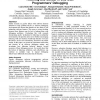Free Online Productivity Tools
i2Speak
i2Symbol
i2OCR
iTex2Img
iWeb2Print
iWeb2Shot
i2Type
iPdf2Split
iPdf2Merge
i2Bopomofo
i2Arabic
i2Style
i2Image
i2PDF
iLatex2Rtf
Sci2ools
CHI
2006
ACM
2006
ACM
Tinkering and gender in end-user programmers' debugging
Earlier research on gender effects with software features intended to help problem-solvers in end-user debugging environments has shown that females are less likely to use unfamiliar software features. This poses a serious problem because these features may be key to helping them with debugging problems. Contrasting this with research documenting males’ inclination for tinkering in unfamiliar environments, the question arises as to whether encouraging tinkering with new features would help females overcome the factors, such as low self-efficacy, that led to the earlier results. In this paper, we present an experiment with males and females in an end-user debugging setting, and investigate how tinkering behavior impacts several measures of their debugging success. Our results show that the factors of tinkering, reflection, and self-efficacy, can combine in multiple ways to impact debugging effectiveness differently for males than for females. Author Keywords Gender, debugging, end-us...
CHI 2006 | Debugging | End-user Debugging | End-user Debugging Environments | Human Computer Interaction |
| Added | 13 Jun 2010 |
| Updated | 13 Jun 2010 |
| Type | Conference |
| Year | 2006 |
| Where | CHI |
| Authors | Laura Beckwith, Cory Kissinger, Margaret M. Burnett, Susan Wiedenbeck, Joseph Lawrance, Alan F. Blackwell, Curtis R. Cook |
Comments (0)

